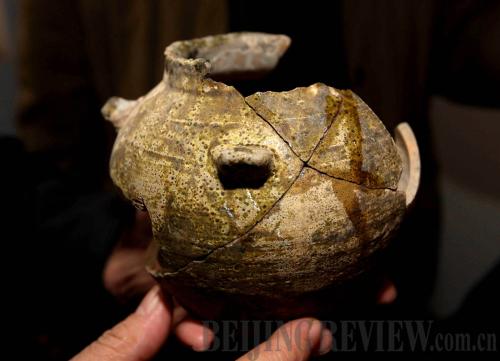|
 |
|
PRIMARY PROOF: Two stone steles with inscriptions of Emperor Wu of the Kingdom of Wei excavated in the ancient tomb in Anyang, Henan ZHU XIANG |
 |
|
RARE RELICS: A ceramic unearthed in the ancient tomb in Anyang, Henan WANG YONGJI |
Profile of Cao Cao
Cao Cao (155-220) was considered a master strategist, politician and poet in China. He began a political and military career in his 20s. After years of building up his military forces, he then emerged to be the military ruler of north China.
In 192, Cao convinced Emperor Xian of the Eastern Han Dynasty to move the capital to Xuchang (in today's Henan Province), where he intimidated the emperor and was permitted to give orders to officials in the emperor's name. This enabled him to promulgate decrees to restore social order and to adopt policies to resume agricultural production in the war-torn areas. These efforts effectively boosted economic development in late Eastern Han Dynasty.
Cao was appointed as prime minister of the Eastern Han Dynasty in 208. From that time on, he enjoyed supreme power and was treated in almost the same way as the emperor. Good at finding talent, he advocated promoting officials solely on the basis of their competence and virtue, disregarding their family background, a breakthrough at that time.
He was also well-known as an accomplished poet. His works, displaying heroic spirit and bold vision, contributed to reshaping the literary style of his time. His major works include Watching the Blue Sea and Short Song Style.
Cao died after a head illness in 220 at 65. After his death, his son Cao Pi founded the Kingdom of Wei, one of the major kingdoms in the Three Kingdoms Period (220-280). Cao Cao was enthroned posthumously as Emperor Wu of the Kingdom of Wei.
In some Chinese folklore Cao has been depicted as a negative figure steeped in atrocities and duplicity. But historians agree that he was a great statesman who played a crucial role in helping maintain social development in the transition from the Eastern Han Dynasty to the Three Kingdoms Period.
By MA XIN
| 